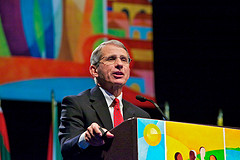The Bahamas has the distinction of being host to the largest ever scientific conference to be held in the Caribbean region. From November 18- 21 more than 2,000 stakeholders from across the Caribbean who have an interest in seeing a reduction in the spread of HIV gathered in Nassau to review findings, learn about best practices and skills building tools, and participate in networking opportunities in order to accelerate actions to stop the spread of HIV in the Caribbean.
With an HIV prevalence of 1% among the adult population, the Caribbean is infamous as the region with the second highest prevalence in the world, after Sub-Saharan Africa. According to UNAIDS, the HIV prevalence varies between and within the countries of the region from 0.1% in Cuba to 3.1% in the Bahamas. But among most at risk populations in some countries it is as high as 31.8%.

Anthony S. Fauci, Director of the National Institute of Allergy and Infectious Diseases in the US Department of Health and Human Services, says over the 30 years since the identification of HIV, there have been significant advances relating to prevention, treatment and care. He noted that today, an HIV diagnosis is no longer a death sentence as people who have access to treatment can now live long and relatively healthy lives.
He suggested a combination HIV prevention strategy including, education, condoms, STI treatment,Prevention of Mother To Child Transmission, male circumcision, adherence to medication, pre-exposure prophylaxis, drug and alcohol treatment, among others to reduce HIV infection risks.

Speaking at the Opening Ceremony for the Conference, on Friday November 17, Prime Minister of the Commonwealth of the Bahamas, the Rt. Honourable, Hubert Ingraham said the best hope for containment of HIV/AIDS is a reduction in the number of new infections.
“We must scale up the prevention of activities that have proven successful if we are to reverse the AIDS pandemic. At the same time, providing treatment and care of people living with HIV/AIDS remains absolutely essential."
While acknowledging that the Bahamas has been proactive in the response to the HIV pandemic and has provided universal access to sustainable, high quality prevention, treatment, care and support services to all residents living with, or affected by, HIV/AIDS regardless of legal status or ability to pay; and has been a leader in developing legislation to protect the rights of minorities and others living with HIV,
"Tremendous strides are being achieved in defusing fears associated with contact with HIV/AIDS infected persons, still, significant stigma and sometimes discrimination persists. This in turn creates a significant barrier to detection, care and treatment", he said.
Geeta Sethi, Director of UNFPA, Sub- Regional Office for the Caribbean said the conference is significant because it brings together close to thirty countries and provides a space to reflect on the significant progress that has been made over the last 30 years.
"So many persons, particularly most at risk youths are speaking openly about their experiences and the challenges they face in enjoying a life of health and equal opportunities. It is a reminder therefore that the countries of the region will need to take some hard decisions that may not always be popular but are necessary in order to eliminate stigma and discrimination and protect the rights of vulnerable groups to universal access to HIV prevention, treatment and care”, she said.
N.B. images provided by Steve Shapiro/2011 Caribbean HIV Conference

